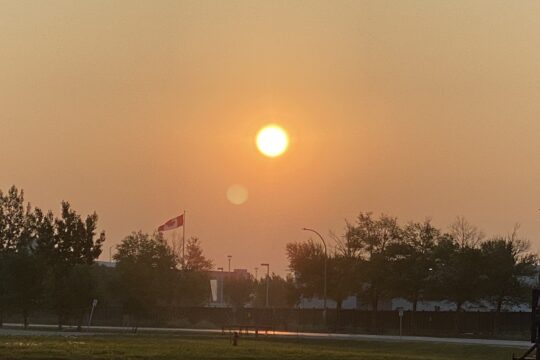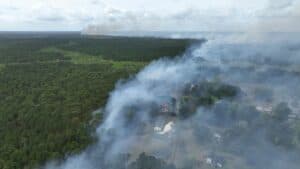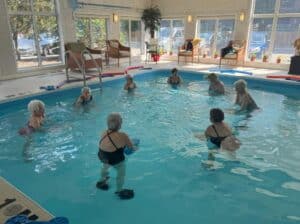
What is air quality? In simple terms, air quality describes the state of the air around us. Good air quality means clean, unpolluted air. Poor air quality means that pollutants reach concentrations that are of concern to human health and/or the environment.
Poor air quality, or air pollution, comes from several factors, including vehicle emissions, industrial activity, and wildfire smoke. Of note, outdoor air quality is influenced by atmospheric and weather conditions. This summer, wildfire smoke has impacted air quality across much of Canada, as shifting air patterns carry smoke far beyond the fire zones.
Here is what you need to know to protect your health during retirement.
How Does Air Quality Impact Older Adults
 According to Air Pollution and Seniors, a Health and Air Quality Bulletin published by the Government of Canada, seniors – along with children and those with compromised immune systems – are more vulnerable to the negative health effects from air pollution Even in healthy individuals, the ageing process reduces lung capacity—the ability of the lungs to take in and use air— making the lungs more sensitive to polluted air. This increased sensitivity can lead to a range of health impacts, including:
According to Air Pollution and Seniors, a Health and Air Quality Bulletin published by the Government of Canada, seniors – along with children and those with compromised immune systems – are more vulnerable to the negative health effects from air pollution Even in healthy individuals, the ageing process reduces lung capacity—the ability of the lungs to take in and use air— making the lungs more sensitive to polluted air. This increased sensitivity can lead to a range of health impacts, including:
- Even low levels of pollution can cause shortness of breath, trigger asthma or COPD, and increase the risk of hospitalization. Symptoms can increase if you are exposed to air pollution for a long time or breathe in a lot of it.
- Exposure to air pollution is associated with accelerated cognitive decline in older people.
- Older people are more likely to chronic health concerns, such as high blood pressure, diabetes and heart disease that can be made worse by exposure to unhealthy air.
Canada generally has good air quality; however, more frequent heat waves and an increase in wildfires means that seniors and their caregivers need to be more aware of air quality during the summer months.
Wildfire Smoke & Your Health
 Wildfire season typically runs from early April to late October in Canada. Smoke travels easily, so those who don’t live in fire prone areas may also experience its effects. During wildfire event, communities across Canada might hear warnings to stay indoors. This is because air quality can be significantly reduced – even when you don’t see the “orange haze” of wildfire smoke hanging over your city.
Wildfire season typically runs from early April to late October in Canada. Smoke travels easily, so those who don’t live in fire prone areas may also experience its effects. During wildfire event, communities across Canada might hear warnings to stay indoors. This is because air quality can be significantly reduced – even when you don’t see the “orange haze” of wildfire smoke hanging over your city.
Smoke contains tiny particles that can be particularly hazardous, triggering inflammation and making it harder for your body to get the oxygen it needs. For seniors, this can lead to serious complications or even hospitalization.
Symptoms resulting from wildfire smoke exposure can include:
- Headaches
- A mild cough
- Production of phlegm
- Sore and watery eyes
- Nose, throat and sinus irritation
If you are experiencing symptoms, it’s important to limit your exposure by reducing or stopping outdoor activities and staying indoors. Limit outdoor activities and strenuous physical activities as much as possible. If you or a loved one experience more serious effects like dizziness, chest pains, severe cough, or shortness of breath, contact your doctor immediately
Canadians can track concentration of wildfire smoke by particulate size using Environment and Climate Change Canada’s Fire Works map.
How can Older Adults Protect Themselves from Poor Air Quality & Wildfire Smoke
 To reduce the impact of poor air quality, especially as we age, follow these simple guidelines.
To reduce the impact of poor air quality, especially as we age, follow these simple guidelines.
- Stay indoors when air quality is poor. Keep windows and doors closed, especially if the Air Quality Health Index (AQHI) indicates high or very high risk. Air conditioners should be set to recirculate mode to prevent outdoor air from entering.
- Use an air purifier. Portable air purifiers with HEPA filters can make a big difference, especially in bedrooms or main living areas.
- Wear a mask if you must go outside. Be aware that not all masks are created equally. A well-fitted N95 mask can filter out the small air particles better than surgical masks.
- Keep medications handy. If you rely on an inhaler or take heart or lung medication, make sure your prescriptions are current and accessible. Let your doctor know if you notice new or worsening symptoms.
- Don’t be afraid to ask for help. If you or a loved one needs help, don’t hesitate to reach out to neighbors, family members, or retirement residence staff.
Protecting Seniors from Poor Air Quality in Retirement Living
At All Seniors Care, creating safe, supportive environments means looking beyond the basics and addressing the invisible factors that influence well-being—like the air we breathe. As part of our commitment to proactive senior care, ASC takes steps to reduce exposure to harmful pollutants:
- We monitor the Air Quality Health Index (AQHI) and adjust outdoor activities accordingly.
- We maintain well-ventilated indoor spaces.
- We ensure staff are trained to recognize symptoms of poor air quality exposure.
- We encourage residents to stay hydrated and rest during hot, humid days when air pollution is at its peak.
Indoor Fun, Rain or Shine: Senior Living Activities
 At All Seniors Care, even when the air quality keeps us indoors, the fun doesn’t stop. Our residents continue to enjoy a high quality of life with creative indoor programming that keeps spirits high and energy flowing. From mini golf in the lounge to bocce ball in the hallways, axe throwing (the safe, foam kind!) in the recreation room, and live musical entertainment in our theatres, there’s always something to look forward to.
At All Seniors Care, even when the air quality keeps us indoors, the fun doesn’t stop. Our residents continue to enjoy a high quality of life with creative indoor programming that keeps spirits high and energy flowing. From mini golf in the lounge to bocce ball in the hallways, axe throwing (the safe, foam kind!) in the recreation room, and live musical entertainment in our theatres, there’s always something to look forward to.
Whether you enjoy a travelogue in the movie theatre at a retirement community in Manitoba, or using the walking track at our new Oakville Estates senior living complex, laughter and friendship fill the air—no matter what’s happening outside.
For more information on how air quality affects seniors, visit Health Canada’s website or check the Air Quality Health Index for daily updates.
Let’s continue ensuring every breath our residents take is a healthy one. For more seasonal wellness tips, explore our full guide to hot weather safety tips: Hot Weather Safety Tips for Older Adults
Together, we can reduce risk and promote a healthier environment—both inside and out. Contact us to arrange a tour at a senior residence near you!
Writer – Julianna McLeod
Julianna is a health and wellness expert at All Seniors Care. Her mission is to create content that empowers seniors to form sustainable solutions for lasting health and happiness. She is an experienced writer, editor, and Recreational Therapist living in Toronto.